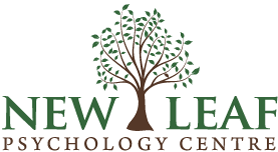Academic Coaching and Career
Counselling Services
Literacy Coaching (year-round)
Literacy Coaches provide the Wilson Reading System, an evidence-based structured literacy program that applies the principles of the Orton-Gillingham approach for students in Grades 2 and above who have a diagnosed learning disability in reading and/or writing. One-to-one sessions are provided twice weekly.
Small group sessions based on the science of reading are also available twice weekly for at-risk students in SK and Grade 1. At risk readers are those who experienced academic interruptions, are not progressing as expected with letter sound association, sight words, and/or spelling, and/or who have a family history of learning disabilities.
Literacy Camp (Summer 2024)
New Leaf Psychology Centre offers a Summer Literacy Camp for at risk readers entering Grades 1 and 2 in the Fall of 2024. At risk readers are those who experienced academic interruptions, are not progressing as expected with letter sound association, sight words, and/or spelling, and/or who have a family history of learning disabilities.
The Summer Literacy Camp is comprised of the Fundations Ready to Rise Literacy Program created by Wilson. Components of the program include word study (phonemic awareness, alphabetic principle, high frequency word recognition), handwriting and spelling (letter formation and automaticity, spelling, punctuation), and application (fluency with connected text). Each day will also have a theme for play sessions offered between academic blocks (e.g., slime making, volcanoes, games day, crafting).
This half-day camp is four weeks in duration (space available for either July or August, options are available for either morning or afternoon half-days).
Executive Functioning Skills Coaching
for children and adults with ADHD or ADHD-like symptoms
Executive Functioning Skills Coaching is a personalized intervention that targets academic, work, emotional, and interpersonal challenges related to difficulties with executive functioning. Coaches help their clients assess where they are now, identify where they want to be, and then determine how to reach their targets. This includes helping their clients with the practicalities of setting personal goals, building their motivation, maintaining their focus, and attaining their goals in a timely and organized manner. Eight core executive functioning skills are targeted during coaching sessions.
Planning/Prioritization: Create roadmaps to reach your goals; Decide what to focus on, and what to let go of.
Task Initiation: Begin projects without procrastinating; Increase efficiency.
Time Management: Estimate your time and allocate it; Meet deadlines and hold limits.
Organization of Workspace and Materials: Create and maintain systems to keep track of information and materials.
Response Inhibition: Take time to evaluate the impact of behaviors and decisions; Think before you act.
Working Memory: Follow multi-step directions and complete complex tasks.
Sustained Attention: Attend to situations or tasks when they are tedious.
Goal-Directed Persistence: Set goals and follow them through to completion.
Coaching is a collaborative approach that facilitates self-reflection and self-discovery in meeting specific, meaningful, and personalized goals. Coaches provide support and encouragement, as well as feedback and practical suggestions. To keep clients accountable to their goals, coaching sessions are scheduled weekly for a predetermined period (typically 6 weeks). Individual sessions are used to set clear short- and long-term goals, review progress on these goals, reflect on the facilitators and barriers of change, and develop a plan to attain the next week’s goals. At the conclusion of the predetermined period, progress is reviewed, and next steps established (which may or may not include an additional predetermined block of coaching sessions).
CogMed
CogMed is a short-term intensive cognitive training program that has shown improvement in attention and working memory. The program is designed for individuals who have a difficult time remembering information or holding a task in mind. The program is offered through a training software program in conjunction with weekly individual meetings with a coach over the span of eight weeks. Between weekly meetings with a coach, clients will complete five online sessions of training for 10 to 45 minutes depending on the clients’ age. Each of these training sessions are gamified, with video-game like activities and rewards offered to encourage completion of assignments. Weekly meetings with the coach include an orientation to the program, check-ins to ensure task completion, troubleshooting of any obstacles, teaching of additional skills, and a wrap-up at completion.
Career Counselling
The goal of career counseling is to help you better understand yourself and the work world in order to make more informed decisions about education, career and life in general.
You could benefit from career counselling if you are:
- choosing a college or university major
- entering the workforce
- wanting greater satisfaction and meaning from your work
- considering a change of careers
- facing an unexpected change in your career path
- planning for a fulfilling retirement
Career counseling begins with an assessment of your current skills (e.g., education and training), interests (e.g., nature, business, helping, science), personality (e.g., sociable, logical, creative), values (e.g., work life balance, need for challenge), and preferred work environments (e.g., outdoors, fast-paced). This is attained through a combination of individual sessions with a career counsellor, a review of your academic/work experience, and questionnaires completed by you. A written report summarizing the findings is provided.
With this information in mind, you and your career counsellor will establish academic and professional goals and develop a strategy to reach those goals. The objective is to determine options that will lead to greater academic and/or work satisfaction while also meeting your lifestyle goals.
Work satisfaction has a significant impact on overall life satisfaction, particularly given that people spend a significant portion of their lives at work. Choosing academic and career options that match your interests and abilities will increase your happiness, self-confidence, and productivity, and at the same time prevent burnout, depression, and anxiety.
